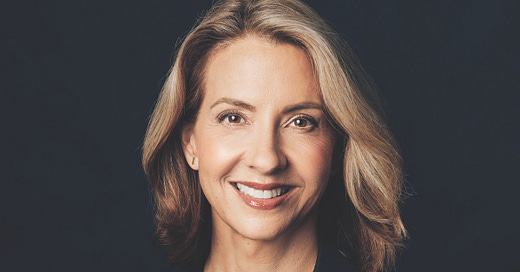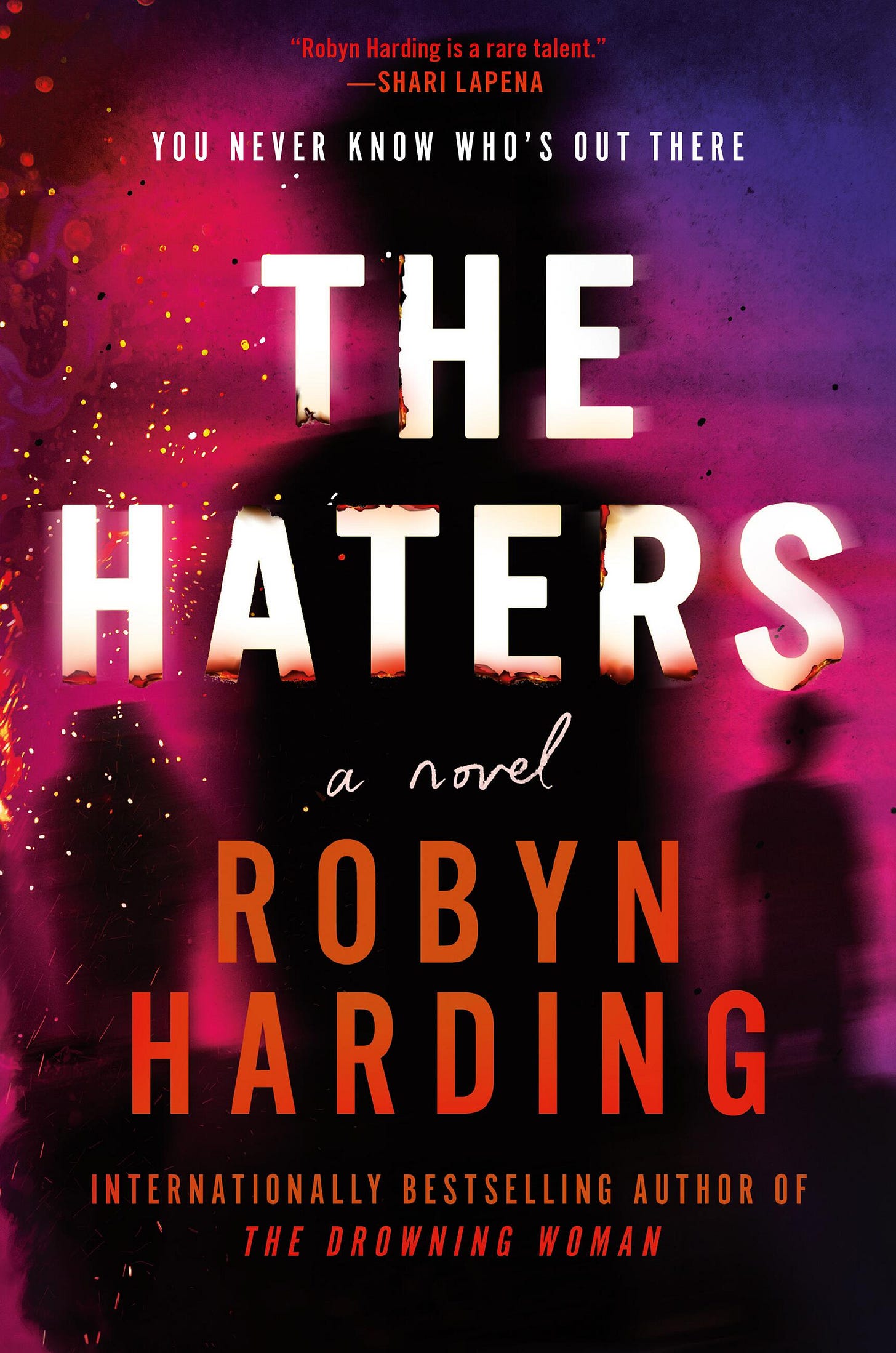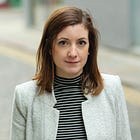CR 008: Robyn Harding on External Validation, the Dark Side of Fame, and Dealing with Haters
The bestselling author discusses her latest psychological thriller, “The Haters.”
Bestselling author Robyn Harding, widely known for penning suspense-filled thrillers, didn’t set out to write about crime. Her 2004 debut novel, The Journal of Mortifying Moments, was a rom-com referred to as “laugh-out-loud funny” by Publishers Weekly. This was followed by additional chick-lit novels—among them, The Secret Desires of a Soccer Mom and Chronicles of a Midlife Crisis. But after writing the screenplay for the 2015 film The Steps, she realized she had a fondness for darker material.
“For so long, I was writing humorous women’s fiction,” Harding says. “And then I wrote my dramedy screenplay. I realized I’m obsessed with the dark side. I love writing thrillers. I love writing twists and intrigue. I think humor can find its way through, but what I find really intriguing is thrillers and mysteries, and the dark side of human nature.”
Since 2017, Harding has published six bestselling thriller novels, including The Perfect Family (“highly entertaining domestic thriller,” Publishers Weekly) and Her Pretty Face (“creepy and compelling,” Kirkus). Now, she’s promoting her latest novel, The Haters, a gripping page-turner which follows an author, Camryn Lane, who thinks the publication of her first novel is going to change her life for the better but is soon grappling with a mysterious reader set on destroying her life.
From her home in Vancouver, Harding recently chatted with me about the book’s themes, her writing process, and what she would do differently if she had to start her career over again.
This content contains affiliate links. I am an affiliate of Bookshop.org and I will earn a commission if you click through and make a purchase.
SANDRA EBEJER: Where did the idea for The Haters come from?
ROBYN HARDING: Sadly, it comes from my personal experience as an author. Over the years, I always had a Contact Me link on my website. I’ve been publishing for 20 years. When I started, all of the messages I received were positive: “This book meant a lot to me” or “This book made me laugh.” As time went on, they got to be less positive. It felt like people were only making the effort to contact me to complain: “I didn’t like the ending” or “Too much swearing.” And then maybe two years ago, I got a really abusive message from a man who I think was mentally ill, because it didn’t really make a lot of sense. But he had read The Perfect Family and had taken offense to a scene where these kids are smoking Shatter, which is concentrated marijuana resin. He seemed to think that I’d overblown the effects of that. Then he started accusing me of being involved in all these conspiracy theories.
I was just like, I am done. I don’t have a Contact Me on my website anymore. I’m very accessible. We’re all accessible through social media. We’re also responsive, and it’s part of the job. But it just made me think, God, this is such a different time to be publishing. Then I started talking about this to other authors, particularly female authors. It feels to be a unique experience to women because I think people are comfortable telling women they’re not good enough, or they have offended you in some way. Whereas, in my anecdotal research, men don’t seem to have the same experience. But a lot of authors have gone through similar things, so I thought, “I could turn this into something really scary and timely.”
The protagonist of the book, Camryn, thinks her life is going to change in incredible ways once her debut novel is published. Looking back, did you have similar ideas about publishing?
Oh my God. Yes! [Laughs] I published my first novel in 2004. It was a different world. There was no social media. People would say, “How’s your book doing?” And I’d go, “I don’t know. I have no idea.” I literally didn’t know what my sales were. I didn’t have any feedback. There was no Amazon. You were just in a complete la-la land of, “I put a book in the world, so good for me” kind of thing.
That sounds nice.
It was a good time! Not that there aren’t positive things about being able to connect now. It was quite a lonely time because I didn’t have the network that I have of readers and author friends and writers. Social media has allowed us to connect so much. But I think the biggest surprise for me was that I thought, like most careers, I’d have a trajectory like this [indicates an upward line] and a writer’s life is not like that. Whenever I’m asked what I wish I’d known, I think it’s the roller coaster of this career—you’re up, you’re down, you’re flat, you’re back up. If you’re in it for the long haul, there’s going to be a lot of ups and downs.
One of the things that jumped out at me was that in the midst of getting accolades and applause for her novel, Camryn gets review bombed and then that’s all she can focus on. The more negative reviews she gets, the more she wants to read them. How do you handle publicity? Do you read your reviews?
I check Goodreads religiously when a book first comes out, just to gauge the feeling, make sure that there’s not something I need to prepare for, and then I stop. It gets to critical mass, and I don’t read anymore. I might look at the rating, but I don’t [read reviews]. There’s not really anything I can do now, right? Reviews are not for me. I understand that. And I wanted to be clear in the book that I’m not telling people they can’t dislike a book. I certainly don’t think that is the way it should be. But letting the author know that you disliked the book is the issue.
There’s a lot in this book about external validation, and our need to have the approval of others. Is that something you’ve grappled with as an author?
Other than this roller coaster nature of career success and sales, probably the hardest thing is to believe in yourself and your abilities. I think you have to take validation where you can get it and from your relationship with your editor. One thing I love about publishing is that you have someone who champions you. I have so much respect for these editors I have worked with who are so intelligent and so well read and so educated. It’s their job to give us enough confidence in ourselves to maintain our self-esteem when we’re bombarded with negative stuff.
They say you feel 30 good reviews less than one bad review. So I try to take little moments of validation, mostly from my editor. The Haters got a starred review in Booklist, and I cling to that. I’m like, “Wow, someone with a real knowledge of books has validated this!” And so if other people don’t take to it or like it, then that’s okay. It’s still a good book.
I learned a new term from your book: digilantism, which refers to internet vigilantism. Camryn is doxed, as well. And it’s clear from the story that there’s very little that can be done, legally, to stop these things from happening. Was there a message that you were trying to get across by writing about these topics?
I just write to entertain. I don’t ever want to be preachy. I don’t have a goal to educate. It’s all about entertainment. But, I mean, the hatred online bred by anonymity is ridiculous. I guess if there’s one thing that I feel maybe readers could take away from this is that when you put yourself out there [as an author], it’s a very vulnerable thing to do. And maybe just think for one second before you attack.
And it’s not just writers. I had a business at one point. I had an ice cream shop with my girlfriend. I thought, “I’m done with writing, I’m done with being judged.” And you’re judged [anyway]! If you have any sort of business or service, it’s constant. People will so quickly give you a one-star review over, “This ice cream wasn’t creamy enough. I waited 30 seconds to be acknowledged when I came in.” It’s amazing how people are so quick to do so without thinking that there are real people behind a product or service.
When did you know you wanted to be an author?
When I was eight, I realized I wanted to be a writer, but I didn’t think it was actually possible. I’m from a very small town in northern British Columbia, a pulp mill town. I was a naturally good writer, but I did not know how to direct that. That being said, I had this very creative education—for a small, blue-collar town, we had really creative teachers. I took a script writing class, I took creative writing, we were making videos and doing radio plays. We were doing all these really fun, creative things. I went to journalism school thinking this is what you do when you can write and then I thought, “I don’t want to do this kind of writing. I’m not a news hound. I don’t want to be covering tragedies and disasters.” So I ended up in copywriting, and then when my kids were little, I had some maternity leave. I had this idea for a book, and I had the unheard-of experience of selling my first manuscript. At the time, I thought, “Well, that means I’ve made it. I’m on my way!” But I got a two-book deal and then they’re like, “Yeah, no thanks. We don’t want another book from you.” [Laughs] I had to start over. That’s part of the business.
Who are some of the authors that have influenced your work?
The queen of thriller writing, to me, is probably Lisa Jewell. I love Liz Nugent. Liz is a friend of mine and she’s just so brave and dark and amazing. Jennifer Hillier is another friend of mine who writes really powerful, fearless, dark stories. I just read Night Watching by Tracy Sierra. It is so scary. I have not been scared reading a book like that in so long. It’s really fabulous. And the other one I love is Ashley Audrain. She wrote The Push and The Whispers, and she is brilliant.
What is your writing process like? Do you plot things out or make the story up as you go?
I am a plotter. But I know people who write 30-page outlines; I write maybe a two-page outline. Because I was a screenwriter for about five years, I use that structure for my books. So I have those certain turning points that I know in my novel, the big plot points, I need to hit. I plot those out, but then how I get there is I pants my way to that plot point. So I’m like, what needs to happen to get me to this point? What can happen in between that will be engaging and wrong-foot readers and make them suspect this person and not this person until I get to the next big turning point? That’s usually how I do it.
When I interviewed Lisa Jewell last year she told me she always starts with a little nugget of an idea, whereas R.L. Stine said he starts with a title. How do you approach your novels? Do you tend to start with the germ of an idea, a specific character, or something else?
I’m a bit like Lisa Jewell in that I start with a premise. Most thrillers, especially mine, are “a blah, blah, blah that goes horribly wrong.” So it’s like, let’s have a couple swap. Oh, that goes horribly wrong. [Laughs] You hear a premise and go, “Okay, how could that turn into someone’s worst nightmare?” Like [with The Haters], publishing a novel by a debut author goes horribly wrong. It’s always the premise.
The other thing I do when I’m plotting is I do character profiles for my main characters, which is another screenwriting thing. It’s just good to have all that information. Sometimes it doesn’t even make it into the book. What’s their relationship with their parents like? What was their childhood like? What’s their education? Sometimes I even put their astrological sign. It informs your writing and informs the things they do in the plot.
Do you have any advice for aspiring novelists?
This is probably unpopular advice, but I always say finish something. Finish a project, whether it’s the project you submit or not. The process of writing the whole 300 pages is an incredible learning experience on a number of levels. I think it’s very easy to start things and not follow through. I did it myself for many years. And I don’t think it was until I pushed through and wrote the entire arc of a character and a plot for 300-odd pages that I really got what it takes to write a novel—what a story entails, all the beats that you need to hit to keep a reader engaged. It’s an incredibly valuable learning experience to write from start to finish, as opposed to writing first acts over and over, which is what I did for years.
I can relate to that. I start to write and then I look at what I’ve written, and I don’t like it, so then I keep trying to fix that thing, as opposed to continuing with the project. Do you have any tricks that you use to push through that?
I do that too. It is tricky. I just write intuitively on how I feel on a given day. So I’m like, “Today is a revising day” and “Today is a push-through day.” I’ll have days where I’m like, “It’s flowing today. I’m just gonna let it rip and write as much as I can today.” Then I’ll go back in and go, “Okay, now I’m going to try to fix this up.” The other thing is distance. If you have the luxury of some time, don’t keep going back to that first paragraph every day. Leave it for as long as you can, and then go back with fresh eyes. And then sometimes the mistakes are so clear, or the things that need to be changed.
If you could go back to the start of your writing career, knowing what you know now, would you do anything differently?
I would handle it differently. Again, we talked earlier about having faith in yourself and self-esteem. [Publishing] can really wear you down. I always say the only job that would be harder on your psyche would be an actor, where you’re actually being rejected for yourself and your looks. I feel like we’re pouring our hearts out and being rejected at every turn or judged or criticized. It’s tough. Had I known that I would need to steel myself that much... It just never occurred to me. I just thought, “I’ll put this book out in the world, and everyone will love it!” [Laughs] And that is not the case. Nor should it be. I mean, there’s different strokes for different folks, and that’s fair. But I would prepare myself for that.
To learn more about Robyn Harding, find her on Instagram.
To purchase The Haters, click here.
This interview has been edited for clarity and length.
You might also enjoy…










I really enjoyed this interview. She has so many great hints and ideas for aspiring writers.
Thanks Sandy!